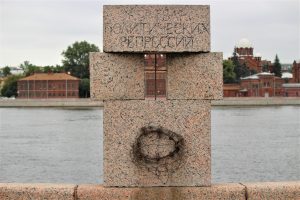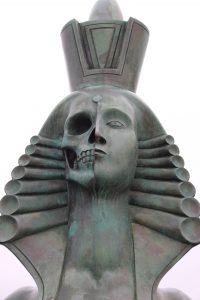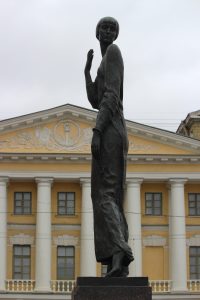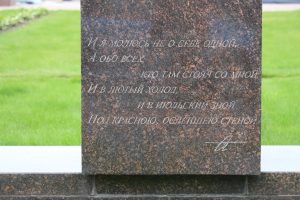The sentencing of Oleg Orlov on 26 February 2024 indicates a turning point in the freedom of historical research in Russia. The Kremlin’s imposition of its political interpretation of history directly contradicts Memorial’s original mission. This form of historical revisionism has led to what can only be described as “crimes against history,” with profound implications for the scientific community and human rights defenders. In the face of this emerging “ministry of truth,” historians face challenging moral and methodological dilemmas.
 “I would like everyone to be called by name, but the list has been taken away, and I don’t know how to do it”(1). These lines by the poet Anna Akhmatova, written in 1930 and dedicated to the memory of her son, sound like an anthem to the Memorial activists fighting to keep the duty of remembrance alive in Russia.
“I would like everyone to be called by name, but the list has been taken away, and I don’t know how to do it”(1). These lines by the poet Anna Akhmatova, written in 1930 and dedicated to the memory of her son, sound like an anthem to the Memorial activists fighting to keep the duty of remembrance alive in Russia.
Founded in 1987, Memorial swiftly and resolutely set itself the urgent task of restoring the memory of Stalinist terror, a mission that is more crucial now than ever. If those in power conceal the past and force us to forget, then to resist is first and foremost to remember. In addition to saving the victims of Stalinism from oblivion, the fight for remembrance has also taken on a more political dimension with the Centre for the Defence of Human Rights.

Metaphysical Sphinx — Monument to the victims of political repression in St Petersburg (photo Céline Bayou, 2019).
Memorial International has always championed a scientific approach to history and advocated the development of a depoliticized national memory, allowing us to confront the darkest pages of our past. However, this noble pursuit is under serious threat. The link between memory and the democratization of political life is challenged by the project to renew the Russian national identity that V. Putin has supported for several years(2). This re-reading of the past poses a grave threat to the political instrumentalization of history, a threat that we cannot afford to ignore. Faced with this return of a “ministry of truth,” we must question the similarities between these two models of control over historical production and the risks they pose for memory producers.
The return of Soviet historical politics in V. Putin’s Russia
In the Soviet Union, history was the central instrument in constructing the political system. From 1922, historical discourse became fixed and could not exist outside political discourse. The Party became where history was made and told, in the image of the film October, which is considered the first manipulation of history in the USSR, by staging the capture of St Petersburg in 1917. History became the domain of Marxist historians, who were obliged to follow a defined political line, eliminating any possibility of constructing an interpretation that differed from the Party’s. As Annie Chernyshev points out in her study of school textbooks(3), this attempt to reread history extended to the whole of society: she notes the disappearance of the great protagonists of history and the adjustment of the periodization and meaning of events to contemporary political variations. This subordination of history to the political agenda gives rise to a biased political conception of history.
In the same way that the USSR was happy to live with its historical coherence, democratic Russia is recomposing representations of its past to impose a unifying official historical narrative. The effort to rewrite history began in 2010, aiming to “revive our national identity”(4). The government is basing its new national narrative on a syncretism between the Tsarist past and the Soviet experience. Over and above the narrative, the Kremlin is also re-appropriating Soviet methodology by infiltrating scientific associations, such as the Russian Military History Society, and marginalizing alternative points of view(5). Since 2009, Memorial has been a victim of this takeover of the historical narrative by the Presidential Commission on History, which controls the writing of the historical narrative and is the State’s spearhead on the “history front.” Finally, to guarantee this “historical continuity,” the Russian State reformed the Constitution in 2020 to protect “historical truth,” as guaranteed by Article 67.3, which prohibits any deviation from the official historical narrative.
The reinterpretation of the USSR’s historical policy in favor of new values implies the same excesses, if not more. Since 2012, state control has tightened to such an extent that rights activists have been alerted to the fate of historians in Russia.

Monument to Anna Akhmatova, St Petersburg (photo Céline Bayou, 2019).
From a state vision of history to crimes against history
The International Federation for Human Rights (IFHR) considers that “the scale of the persecution [in Russia] justifies speaking of ‘crimes against history’”(6). This notion is taken from the book Crimes Against History by the historian Antoon de Baets: the author adopts a human rights perspective to demonstrate the mutual influence of history and politics and the structuring role of censorship in the development of historical science. For A. de Baets, crimes against history are the most radical forms of censorship to which historians are subjected, particularly “abuses of history that constitute violations of human rights”(7). By infringing the rights to life, freedom of expression, equality, and culture, it is not only the integrity of history that is at stake but also, according to A. de Baets, the conditions of the rule of law. This notion provides a relevant analytical grid for characterizing the actions undertaken by the Russian authorities in their work of politically re-reading history:
- Intensified control over the activities of human rights defenders, with the Law against Extremism and the Law on Foreign Agents passed in 2011 and 2012, respectively. The broad application of these laws means that historians and NGOs can be charged with a wide range of offenses. Moreover, these laws are reminiscent of the language used during the significant Moscow trials between 1936 and 1938, when half the charges were worded “foreign agent”(8).
- Since 2016, campaigns of denigration and intimidation have been instituted: searches, repeated tax inspections, and threats against members of Memorial have multiplied. In 2021, one of Memorial’s leading figures, historian Yuri Dmitriev, was wrongly accused of pedophilia and sentenced to 15 years in prison.
Whereas the Soviet model allowed historians to work for the benefit of the Party, the Putin administration has blocked the publication of studies that do not conform to its political agenda. On 28 December 2021, the Russian Supreme Court decided to dissolve the Memorial Association for having breached the Law on Foreign Agents and for having advocated “terrorism” and “extremism.” The politics of history have been taken to extremes, but this time with no equivalent counterweight to the Russian dissidence spearheaded by Alexander Solzhenitsyn in the 1960s.
What is at stake today is a more profound imperative: acknowledging the crimes documented by Memorial and naming the culprits would be tantamount to condemning the Soviet regime and thus undermining the very foundations of the current government, which claims to be the successor to the USSR and whose president is a former KGB officer(9). Just as Trotsky said in 1924 that “one can only be right with and through the Party,” Memorial’s quest for historical truth collided with the will of the Kremlin and became the very example of the regime’s closure.

“That’s why I pray not for myself
But all of you who stood there with me
Through the fiercest cold and scorching July heat
Under a towering, completely blind red wall.”
(extract from the poem Requiem, Monument to Anna Akhmatova, Saint Petersburg) (photo Céline Bayou, 2019).
Faced with the decline of democratic values in Russia, as demonstrated by V. Putin’s “re-election” to a 5th term on 17 March 2024, it is necessary to continue to make history to counter the official historical narrative. Historical science must be reflected in the historian’s commitment, relationship with the truth, and dissemination of this truth to a broad audience(10). To quote Antoine Prost: “History is indispensable to the committed man”(11). A commitment to preserving the right to make history goes far beyond the mere integrity of historical discourse. What is at stake here are the conditions for dignified citizenship. To remain committed, it is now necessary for historians to go beyond the limits imposed by their field of research by using digital investigation. The use of OSINT (Open source intelligence) makes it possible to retrieve information from open sources, and these topical subjects can provide a soothing to field research to write immediate history and avoid collective amnesia.
Notes:
(1) Anna Akhmatova, “Requiem” [1940], in Requiem. Poème sans héros et autres poèmes, ed. and trans. by Jean-Louis Backès, Paris, Gallimard, “Poésie/Gallimard” series, 2007.
(2) Dominique Colas, “Poutine révise l’histoire et impose la mémoire”, in D. Colas (ed.), Poutine, l’Ukraine et les statues de Lénine, Paris, Presses de Sciences Po, “Hors collection,” 2023, pp. 117-146.
(3) Annie Bruter, “Annie Tchernychev - L’enseignement de l’histoire en Russie de la Révolution à nos jours”, Histoire de l’éducation, 109, 2006, pp. 142-144.
(4) Vladimir Putin, Presidential Message to the Federal Assembly, 12 December 2012.
(5) Anne Le Huérou, “Le front de la mémoire”, Revue Projet, vol. 388, no. 3, 2022, pp. 87-90.
(6) FIDH, Russie : un récit historique bâti sur l’oppression des producteurs d’Histoire, report of the international fact-finding mission No. 770f, June 2021.
(7) Antoon De Baets, Crimes against history, London, Routledge, 2018.
(8) Arseni Roginski, Alexandre Daniel, Alexis Berelowitch, “Russie : le pouvoir contre les ONG - Le point de vue de Mémorial,” Le Débat, vol. 178, no. 1, 2014, pp. 183-192.
(9) Nicolas Werth, Poutine historien en chef, Paris, Gallimard, 2022, pp. 1-63.
(10) Annette Wievorka, “L’historien au risque de l’engagement”, Questions de communication, 2, 2002, pp. 137-143.
(11) Antoine Prost, “Comment l’histoire fait-elle l’historien ?”, Vingtième Siècle, revue d’histoire, n° 65, January-March 2000, pp. 3-12.
Thumbnail: Opposite the famous Kresty prison described by A. Akhmatova in her poem Requiem, the Monument to the Victims of Political Repression, St Petersburg (photo Céline Bayou, 2019).
* Antoine Richard holds a Master’s degree in the History of International Relations from Sorbonne University and is a student at Inalco.
Link to the French version of the article
Translated from French by Assen SLIM (Blog)
To quote this article: Antoine RICHARD (2024), “Memorial to the crimes against history perpetrated by the authorities”, Regard sur l’Est, 1st April.
